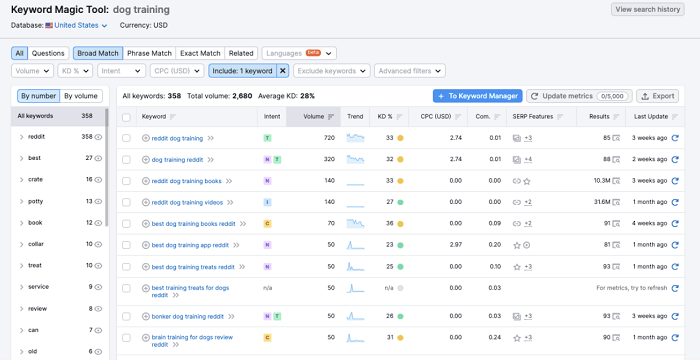Semrush Keyword DifficultySemrush is a digital marketing platform that is of great help to businesses, irrespective of their size, in improving their visibility and online reach. It offers several features for SEO (search engine optimization) and SEM (search engine marketing), including keyword research, site audit, backlink analysis, and many more. All these features are designed for businesses to increase their online traffic and improve their website's ranking on search engine result pages. One of the best and most popular features of Semrush is its keyword difficulty tool, which helps users analyze the difficulty level of any particular keyword. In simple terms, it means that by using this feature of Semrush, the users can easily check how easy or difficult it is to rank for any particular keyword on search engine result pages (SERPs). It gives the users an idea about the competition they will face if they choose that particular keyword. The users need to consider the difficulty of the keyword they have chosen, and therefore keyword difficulty becomes a very important metric while doing research on keywords for websites or blogs. Analysis of keyword difficulty helps users identify keywords with very low competition but high potential. It also helps in determining those keywords that may be too difficult to rank for, given your current site authority and strategy. What is Keyword Difficulty?Let's learn more about keyword difficulty and why its role in the digital marketing world is considered so important. 
Keyword difficulty means the level of competition that a particular keyword carries. It is a measure that shows how difficult it could be for the user to rank any specific keyword because of the level of competition it faces. A high difficulty score for any keyword means it is very difficult to rank for. For example, suppose any food blogger wants to use any keyword, i.e., healthy recipes, to get ranked on search engine platforms. In that case, there are chances that it would be very difficult for the blogger to rank it as many other websites are using the same keyword, which increases the competition and lowers the probability of that particular keyword's ranking. However, if he uses any keyword like "healthy dinner recipes for busy moms", then there is a high chance that the article may rank as such kind of keyword does not have much competition. Keyword difficulty is an important metric that must be considered by bloggers while doing research for the keyword. It helps the users make informed decisions like which keyword they should target for their content. By analyzing a keyword and its competition, it becomes easier for content writers to decide whether they should invest more time and resources in creating content to rank for that particular keyword. Keyword difficulty also helps you find keywords with low competition but a high ranking potential for your niche, which can help in ranking the content on SERPs. Using such keywords, the content creator can easily attract more website traffic. Factors that Affect Keyword DifficultyWhen it comes to determining the Keyword Difficulty score of a particular keyword, there are several factors that come into play. Let's take a closer look at some of the most important factors that can affect Keyword Difficulty: 1. CompetitionCompetition is one of the main factors that can easily affect keyword difficulty. Suppose there is any specific keyword, and a huge number of websites are targeting that particular keyword, then it automatically increases the competition for that keyword which results in making it more difficult for the content to rank for that specific keyword. However, if there is a keyword that is not targeted by many companies, in such a situation, the difficulty level to rank for that particular keyword remains low, and content creators can use that keyword to rank content for that keyword easily. 2. Search VolumeThe search volume of a keyword refers to the number of people who are searching for that keyword on search engines like Google. Generally speaking, the higher the search volume, the more difficult it will be to rank for that keyword since there will likely be more competition. 3. RelevanceThe relevance of a keyword to your content and target niche is also important. If your content is not relevant to the keyword you're targeting, it will be more difficult to rank for that keyword. Make sure you choose highly relevant keywords for the content you're creating. 4. Domain AuthorityDomain authority refers to the overall authority of your website. If your website has a high domain authority, it will be easier to rank for keywords since search engines view your website as a trusted source of information. Conversely, if your website has a low domain authority, ranking for keywords will be more difficult. 5. BacklinksBacklinks are links from other websites that point to your website. The number and quality of backlinks you have also affect your Keyword Difficulty score. Generally speaking, the more high-quality backlinks you have, the easier it will be to rank for relevant keywords. By considering these factors when doing keyword research, you can better understand how difficult it will be to rank for a particular keyword. It's important to strike a balance between high search volume and low competition keywords and choose highly relevant keywords for your content. Building a strong domain authority and securing high-quality backlinks can also help you improve your chances of ranking for most keywords. How to use the Semrush Keyword Difficulty Tool?Semrush Keyword Difficulty Tool is an incredibly useful resource for digital marketers looking to improve their SEO strategy. Here's a step-by-step guide on how to use the tool effectively: 
By using the Semrush Keyword Difficulty Tool, you can quickly and easily determine the difficulty level of a particular keyword. This can help you make more informed decisions about which keywords to target in your content, ultimately improving your chances of ranking higher in search engine results pages. Tips for Using Semrush Keyword Difficulty ToolSemrush Keyword Difficulty Tool is an incredibly powerful resource for SEO professionals, and with a few tips and tricks, anyone can use it to improve your keyword research and content strategy. Here are some tips for using the tool effectively:
Keyword Difficulty vs. Search VolumeKeyword Difficulty and Search Volume are the two important metrics in SEO that prove to be very useful for the content writer. These two metrics can help the users in determining the keywords the content writer should target to improve their content strategy. However, these two are totally different from each other, but both are equally important. Let's take a look at the differences between these two metrics and why it is important to balance them. As we mentioned earlier, Keyword difficulty is a metric that tells the users about the level of competition a particular keyword is facing and how difficult it could be to rank any specific keyword. There are various factors on which the keyword difficulty level depends, like domain authority, competition, and backlinks. A higher difficulty score for any keyword indicates that it will be more difficult to rank content for that keyword on search engine results pages (SERPs). On the other hand, Search Volume is a metric used to measure the number of people searching for any particular keyword. If the search volume of a keyword is high, it simply means that many people are searching for that particular keyword and the competition is high. If a content writer aims to create an ideal content strategy, he must consider both keyword difficulty score and search volume to rank his content on search engine result pages (SERPs). It is suggested to choose keywords with low difficulty scores but high search volume for your content strategy. These keywords are easier to rank and generate a good amount of traffic to your website. However, it is also very important that you use keywords that are related to your business because even if you have chosen a keyword with a low difficulty score and high search volume, but is not related to your business, then it will be a waste of your time to put further effort to target such keywords. Similarly, suppose there is any keyword that is highly relevant to your business but has a very low search volume. In that case, it will not be able to increase the traffic on your website, and therefore, such keywords are suggested to be ignored. Common Mistakes in Keyword ResearchKeyword research plays a very important role in making any SEO strategy, and now this can be easily done with the Keyword difficulty tool of Semrush. Keyword difficulty tool can help users in finding the keywords suitable for their websites according to their needs. However, even with the help of Semrush's keyword difficulty tool, some users still make mistakes when researching keywords. Here are some pitfalls to avoid when using the Semrush Keyword Difficulty tool and some examples of common mistakes: 
1. Not Considering RelevanceOne big mistake to avoid is choosing keywords that are irrelevant to your websites and businesses. This is because even if you succeed in generating traffic to your website using any irrelevant keyword, you will still not be able to convert that traffic into customers or leads, and therefore it is very important for anyone to target those keywords only which are relevant to their business or websites. 2. Ignoring Long-tail KeywordsUsers should not ignore long-tail keywords because they are longer, which is why they contain specific phrases that are less competitive than broad keywords. If you are ignoring long-tail keywords, there are huge chances you miss out on valuable traffic that would have converted into customers or leads. 3. Focusing only on Search VolumeThere is no doubt that search volume is an important metric that should be considered along with the keyword difficulty score, but it is not the only thing on which we should depend while doing research. For example, let's say you choose a keyword with high search volume but it has a high keyword difficulty score. Although this can generate a lot of traffic, content targeting those keywords will be difficult to rank for. 4. Ignoring the CompetitionAnother important thing that you should not ignore is the level of competition that your chosen keyword is facing. For example, if your competitors are already ranking highly for the keywords you are targeting, it will be very difficult for you to overtake those competitors and get your content ranked on the search engine results pages. The Bottom LineKeyword research is an important part of any SEO strategy, and the Semrush Keyword Difficulty tool can help you choose the right keywords for your website. By understanding the factors that affect Keyword Difficulty and how to use the Semrush tool, you can choose keywords that will help you rank higher in search engines and drive more traffic to your site. Remember to choose keywords that are relevant to your business, consider long-tail keywords, and analyze the competition. Don't focus on just one factor; find opportunities with multiple factors like search volume, keyword difficulty score, and more to find the right keywords for your niche. By following these tips and avoiding common mistakes, you can improve your keyword research and increase your chances of success. Remember that SEO is an ongoing process, and monitoring and adjusting your strategy as needed is important. Keep up with changes in search engine algorithms and adjust your keywords accordingly. With patience and persistence, you can achieve better search engine rankings, more traffic, and, ultimately, more business success over time.
Next TopicSemrush SEO Writing Assistant
|
 For Videos Join Our Youtube Channel: Join Now
For Videos Join Our Youtube Channel: Join Now
Feedback
- Send your Feedback to [email protected]
Help Others, Please Share










